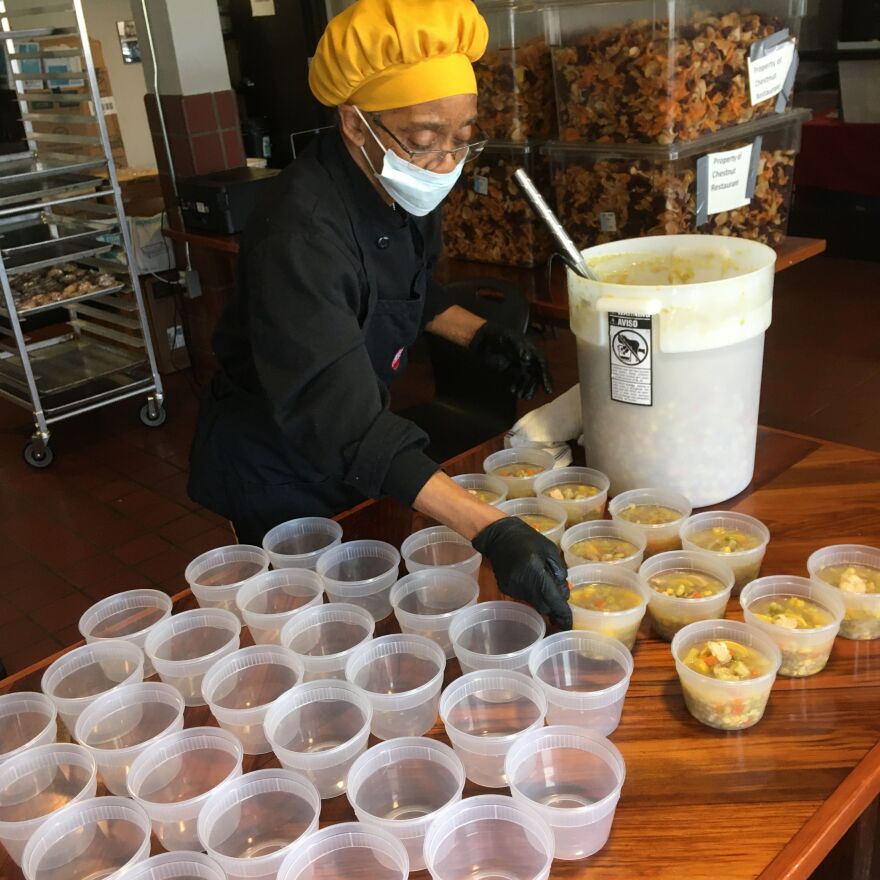Age, health, income, and race are all factors in the spread and severity of COVID-19. For seniors living in Asheville Housing Authority residences, isolation is key to slowing the spread, according to officials. But those seniors also need nutritious food. A new collaboration between farmers, chefs, and the Housing Authority is bringing meals to their doorsteps via the Southside Kitchen.
Hanan Shabazz has been feeding the Asheville community since the 1970s, first at her own Shabazz Restaurant, and most recently as a culinary mentor at the restaurant Benne on Eagle. Her food is legendary in the neighborhood known as The Block and beyond.
She’s well known for her desire to feed everyone, but she says she’d never take on a project this big by herself. Shabazz is one of the chefs fueling a new collaboration at the Southside Kitchen, which is now delivering meals to homebound and quarantined seniors living in the Asheville Housing Authority residences.
In late March, Shabazz joined forces with two of Asheville’s best known chefs, John Fleer and Mark Rosenstein. She also heard from Aaron Grier of Gaining Ground Farm in Leicester.
Like a lot of farmers, Grier had a problem. He had crops in the ground, destined for restaurants that had closed or were operating in limited capacities. The farm expanded its Community Supported Agriculture (CSA) program, but Grier wanted produce to reach as many people as possible.
During one of their regular phone calls, Grier asked Fleer if there was a way to reimagine the CSA concept so the produce could go directly to the Southside Kitchen. They connected with David Nash, executive director of the Asheville Housing Authority, who confirmed that there were many seniors in need of nutritious meals. Nash also witnessed the public’s desire to help residents.
“For the first couple of weeks, we saw people kind of literally stumbling over themselves to come into some of our properties and help,” he said. “We all want to help and we all should help, but we need to remember that the greatest need is for folks to be able to isolate themselves.”
The whole group crafted a plan that would use community support to bring fresh food to the doorsteps of seniors living in Housing Authority residences. Grier calls it We Give A Share.
The public donates the cost of a CSA share, which can range from $50 to $500. Local farms, like Gaining Ground, deliver fresh produce in bulk to the Southside Kitchen, where chefs Shabazz, Fleer, Rosenstein, and their teams turn it into nutritious meals.
The meals are delivered to the residents’ doorsteps by Housing Authority maintenance staff who are experiencing reduced workloads. Additional funding is provided by Buncombe County through the Green Opportunities program and the City of Asheville.
The crisis kitchen kicked into gear on March 24th, delivering one hundred meals. It’s grown day-by-day, and they anticipate producing 500 meals a day as more spring produce is ready to be harvested.
“This is reaching into a new realm for our vegetables,” Grier said. “I think it's something that we can feel good about and that the whole community can feel good about participating in and playing an active role.”
Fleer says bringing high-quality fresh produce into the Southside Kitchen and delivering it to those in need is a step towards breaking down barriers in the farm-to-table movement.
“I think that this program is doing an amazing job of smashing that wall and getting good, locally grown produce on the tables of people who need the food at this particular moment and hopefully that will sustain on into the future,” he said.
The team plans to continue the collaboration after the COVID-19 crisis, with an emphasis on providing kitchen training for people starting new careers. In the meantime, Hanan Shabazz and the chefs are cooking chili, potatoes, lasagna, and lots of vegetable soup.
“It makes me feel good when I get a report back from somebody that I least expect telling me how great this food is and how much they really appreciate having a good, nutritious, delicious meal every day,” Shabazz said.
The chefs and farmers agree that programs like this will strengthen the resiliency of the local food system now and into the future.
More information about how to support the Southside Kitchen can be found at www.wegiveashare.org


